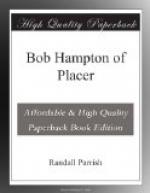He was in this mood when he overtook the Rev. Howard Wynkoop and marked the thoughtful look upon his pale face.
“I called at your camp,” explained Wynkoop, after the first words of greeting had been exchanged, “as soon as I learned you were here in command, but only to discover your absence. The sergeant, however, was very courteous, and assured me there would be no difficulty in arranging a religious service for the men, unless sudden orders should arrive. No doubt I may rely on your cooeperation.”
“Most certainly,” was the cordial response, “and I shall also permit those desiring to attend your regular Sunday services so long as we are stationed here. How is your work prospering?”
“There is much to encourage me, but spiritual progress is slow, and there are times when my faith falters and I feel unworthy of the service in which I am engaged. Doubtless this is true of all labor, yet the minister is particularly susceptible to these influences surrounding him.”
“A mining camp is so intensely material seven days of the week that it must present a difficult field for the awakening of any religious sentiment,” confessed Brant sympathetically, feeling not a little interested in the clear-cut, intellectual countenance of the other. “I have often wondered how you consented to bury your talents in such a place.”
The other smiled, but with a trace of sadness in his eyes. “I firmly believe that every minister should devote a portion of his life to the doing of such a work as this. It is both a religious and a patriotic duty, and there is a rare joy connected with it.”
“Yet it was surely not joy I saw pictured within your face when we met; you were certainly troubled over some problem.”
Wynkoop glanced up quickly, a slight flush rising in his pale cheeks. “Perplexing questions which must be decided off-hand are constantly arising. I have no one near to whom I can turn for advice in unusual situations, and just now I scarcely know what action to take regarding certain applications for church membership.”
Brant laughed. “I hardly consider myself a competent adviser in matters of church polity,” he admitted, “yet I have always been informed that all so desiring are to be made welcome in religious fellowship.”
“Theoretically, yes.” And the minister stopped still in the road, facing his companion. “But this special case presents certain peculiarities. The applicants, as I learn from others, are not leading lives above reproach. So far as I know, they have never even attended church service until last Sunday, and I have some reason to suspect an ulterior motive. I am anxious to put nothing in the way of any honestly seeking soul, yet I confess that in these cases I hesitate.”
“But your elders? Do not they share the responsibility of passing upon such applications?”
The flush on Mr. Wynkoop’s cheeks deepened, and his eyes fell. “Ordinarily, yes; but in this case I fear they may prove unduly harsh. I—I feel—that these applications came through the special intercession of a certain young lady, and I am anxious not to hurt her feelings in any way, or to discourage her enthusiasm.”




